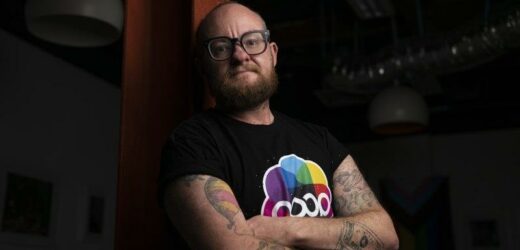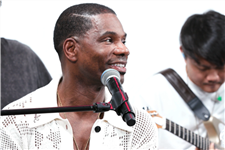LGBTQI advocates fear the 2021 census results, which start to be unveiled next week, will dramatically underestimate gender diversity in Australia because of a poorly worded question asking whether people identify their sex as male, female or “non-binary”.
Some advocates believe the results will be so flawed the Australian Bureau of Statistics (ABS) should not release the figures showing how many Australians chose the new “non-binary” option when asked to identify their sex.
LGBTQI advocate Teddy Cook is concerned about the accuracy of the latest census data. Credit:Rhett Wyman
Rodney Croome, a spokesman for the Just.Equal Australia lobby group, said the non-binary sex option was a “useless hybrid” that conflated people who are transgender and intersex as well as those who identify as gender non-binary.
“Many transgender people would have ticked male or female, people with a non-binary gender identity would have wondered if ‘non-binary sex’ applied to them and many intersex people would also have found it confusing,” Croome said.
“My fear is that the number of people who ticked ‘non-binary’ will be very low and this will be weaponised by opponents of transgender equality and inclusion.”
Teddy Cook, a board member of the Australian Professional Association for Trans Health, said the ABS was well-intentioned, but the sex question would produce “inaccurate data that’s highly likely to mislead”.
Cook, who is trans, said the ABS would be better off not releasing the figure and work towards formulating questions for the 2026 census that reflect its own standards for collecting data on sex and gender.
“Our community wants to be known and seen, but it’s impossible to drill down into data this inaccurate,” Cook said.
An ABS spokeswoman said the bureau would not be including a non-binary sex count in the first release of the 2021 census data next Tuesday.
“The data collected from the sex question will be reported in the 2021 census data releases as ‘Male’ and ‘Female’,” the spokeswoman said.
LGBTQI groups want the next census to include questions on gender identity, sexual orientation and intersex status. Credit:iStock
“Later this year, the ABS in consultation with key stakeholders in the LGBTQI+ community to understand the complexities, data quality and usefulness of the data.”
Roen Meijers, who identifies as non-binary, said the non-binary sex question would produce “garbage data” of extremely little utility.
“I am very well-educated on questions of gender and sexuality and I had no idea how they wanted me to answer that question,” said Meijers, who made history in 2019 as the first person in Tasmania to have their birth certificate list their gender as something other than male or female.
“I have concerns about how the data will be misunderstood, misconstrued and misused.”
NSW One Nation leader Mark Latham has repeatedly and falsely said the 2016 census showed only 1300 Australians identified as transgender.
In that census 1260 respondents listed their sex or gender as something other than male or female while a further 2400 ticked both male and female boxes. A separate online form was required to record a sex other than male or female.
The ABS later acknowledged the figures did not accurately measure the number of people in Australia with a sex or gender other than male or female.
Cody Smith, senior projects officer at Intersex Human Rights Australia, said they were extremely frustrated by the “non-binary” sex question.
Cody Smith, who is intersex, said they were extremely frustrated by the phrasing of the census sex question.
Smith said the term non-binary nearly always refers to the gender identity of people who do not identify as exclusively male or female. Intersex, meanwhile, describes people whose innate sex characteristics don’t fit medical and social norms for female or male bodies.
“Non-binary sex is not language that either group would use for themselves,” said Smith, who is intersex.
Accurate figures were essential when lobbying for more funding for LGBTQI services, Smith said.
The 2021 census did not include any specific questions on whether people identify as gay, lesbian, bisexual or transgender.
Anna Brown, chief executive of Equality Australia, said the sex question was confusing and rendered transgender Australians largely invisible.
“This means that next week’s census results won’t reflect the gender diversity in the Australian community – a missed opportunity to inform crucial decisions about what services are provided to our communities and where,” she said.
The next census should include separate questions on gender identity as well as questions about sexual orientation and intersex status, she said.
Fascinating answers to perplexing questions delivered to your inbox every week. Sign up to get our new Explainer newsletter here.
Most Viewed in National
From our partners
Source: Read Full Article





